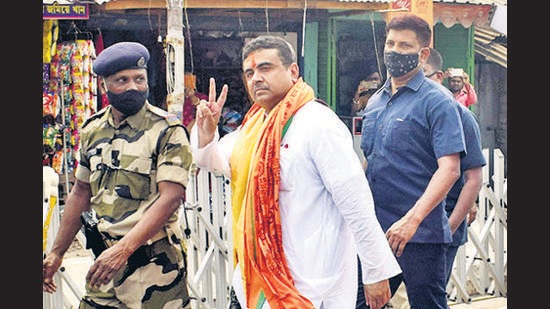What the battle of Nandigram says about Bengal’s politics
Fighting for his political life, Suvendu Adhikari has turned to Hindu-Muslim polarisation. Whether this will be enough to dent Mamata Banerjee’s appeal is to be seen
All eyes are on Nandigram. The constituency will see a high-stakes electoral battle between West Bengal’s chief minister (CM) Mamata Banerjee and her friend-turned-foe Suvendu Adhikari, purported to be the most influential strongman in the region. This has rapidly turned into a battle of egos and perception for Banerjee’s Trinamool Congress (TMC) and Adhikari’s new political home, the Bharatiya Janata Party (BJP). While it is easy to get caught up in the media frenzy, a close look at how the contest in Nandigram has unfolded offers clues into the changing pattern of West Bengal’s politics.

As I have argued earlier, much of the state’s politics is predicated upon the control of the gram panchayats. This system, perfected during Left rule, ensures that the access of citizens to the State is mediated through a powerful gram panchayat, effectively requiring significant territorial control of villages for large-scale policy implementation.
To understand the importance of Adhikari in this system, it is useful to look closely at the organisation or “disorganisation” of the TMC. Left rule in West Bengal was unique in India’s party system due to its level of organisational strength and professionalisation. While it employed local strongmen and had its share of charismatic faces, the Left sought to instil devotion to the party above all — so much so that voters would mockingly call Left rule in Bengal a dalatantra (“rule by party”).
When the TMC surged to power in the 2011 state elections (but really in the 2008 panchayat elections), it had to manufacture a model of stable territorial control without the organisational coherence of the Left. What emerged was an inchoate collection of strongmen and their factions coalescing around the charismatic persona of Banerjee who could guarantee such ground-level control. Adhikari was among the best at this job.
In the 2018 panchayat election, Adhikari ensured that the TMC was elected unopposed in 23% of gram panchayat ward-member seats, and that it had a strike rate of 79% in contested seats in his East Midnapore district. In 2019, even as the BJP swept surrounding areas en route to 18 out 42 parliamentary constituencies, it only managed to win two out 20 assembly segments in the parliamentary constituencies of Tamluk, Kanthi, and Ghatal — where Adhikari wields significant influence.
Given the strong anti-incumbency faced by the TMC on the ground, it may seem odd that the BJP has been so welcoming of Adhikari and other “tough elements” from the TMC. But the BJP’s willingness to take in defectors is acquiescence to the need for ground-level control to win in West Bengal.
When Adhikari switched sides to the BJP, and Banerjee forced a contest against him, it became natural to wonder to whom Nandigram’s TMC supporters were beholden. In 2019, the TMC won 63% of the vote in Nandigram as compared to 30% for the BJP. Is Adhikari so important to the TMC on the ground that he can take 15-20 percentage points of vote share with him to the BJP?
Given the large-scale defections from the TMC to the BJP in the run-up to the election, this question is relevant for us to understand the extent to which such defections can dent the TMC. Indeed, the Congress too has a well-chronicled history of internal factionalism and party defections, something the BJP has readily taken advantage of in states such as Madhya Pradesh and Tripura.
But the TMC differs in one key respect — the party structures its political appeal around the charisma of Banerjee (not unlike the modern-day BJP around Narendra Modi at the national level), whereas the Congress remains factionalised at the state level. This is something Adkhikari seems to have understood as well. While his campaign started with focusing on his previous work in the constituency, it soon became apparent that Banerjee’s larger-than-life image could not be defeated.
Fighting for his political life, Adhikari and the BJP have turned to Hindu-Muslim polarisation, with Adhikari claiming that the re-election of Banerjee as CM will turn the state into a “mini-Pakistan”. This is all the more shocking as Adhikari was highly popular in the Muslim community as he presided over a TMC organisation with significant Muslim presence. This is to say nothing of the farmer protests in Nandigram that led to the ouster of the Left, which were also seen as a picture of Hindu-Muslim unity.
Like so many politicians before him, Adhikari has cynically understood the political power that comes from communal division. Today, the fact that a quarter of Nandigram’s population is from the Muslim community and detailed “demographic” calculations in Nandigram — namely the significantly larger Muslim population in the larger Nandigram 1 block as compared to Nandigram 2 block — are splashed across newspapers in India.
With just 16.5% of the population of Nandigram from the Scheduled Caste or Scheduled Tribe population, it is a sign that this polarisation has moved past its “subaltern” phase. This is also a sign that the BJP will seek to manage the internal contradictions of political defection and caste division through explicit Hindu-Muslim polarisation. I cannot predict who will win Nandigram, but I can predict one thing: Nandigram will never be the same again.
Neelanjan Sircar is an assistant professor at Ashoka University and senior visiting fellow at the Centre for Policy Research
The views expressed are personal



